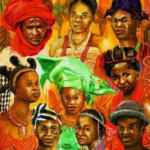Nigeria has a lot of traditional practices. Even though Nigeria is part of the modern world and has a modern economy and society, some tribes still prefer to live by these traditional practices.
Still, some of these traditional practices are harmful and don’t make sense in the modern world. For example, the Anti-Child Abuse Society in Nigeria says that many harmful traditional practices hurt children directly.
There are many harmful traditional practices among African tribes. Violence against children and women is one of the most difficult things to deal with in this part of the world.
In Nigeria, Cameroon, South Africa, and many other African countries, they are often hurt by harmful traditional practices.
This article will look at 20 harmful traditional practices in Nigeria. Keep reading!
20 Harmful Traditional Practices In Nigeria
This section will enlighten us on these harmful traditional practices.
1. Female Genital Mutilation
This is sometimes called female circumcision. It’s a cultural practice where a girl’s genitalia is removed partially or completely for no medical reason.
In some African cultures, this is a part of what it means to become a woman. So, the procedure is done on young girls when they are going through puberty.
People think that female genital mutilation is done to ensure women stay virgins. Some tribal cultures think that a woman’s external organs are dirty.
So, they think that cutting the girls’ organs is a way to clean them.
Female circumcision is a harmful traditional practice that infringes on the sexual rights of females.
In Nigeria, it is a common cause of vesicovaginal fistula, vaginal stenosis, trouble giving birth, bleeding, and the spread of hepatitis B, HIV, and tetanus. In addition, FGM hurts the girl’s mental and sexual health.
2. Women Blamed for Barrenness
Blaming women for barrenness is one of the harmful traditional Practices In Nigeria that actually need to stop.
Take note of what infertility means in medical terms. It means a couple can’t get pregnant after 12 months of unprotected, ejaculatory sex at least three times a week without protection.
This means that both the man and the woman in marriage play a big part in having children.
However, in Nigeria and other parts of Africa, only the woman is to blame for being unable to have children.
The woman is the only one who has to undergo a series of gynecological tests with her husband and his family.
This bad idea puts the woman under a lot of stress and makes her look for help anywhere, even from quacks, to get pregnant.
During her search, she might go to quacks and try any number of dangerous health practices.
3. Maltreatment Of Widows
Being a widow is very bad, especially in Igboland and other parts of the country. The dead husband’s wife is accused of killing him and is made to drink the dirty water used to wash his body.
She is also booed, pushed around, beaten, and despised. She and her kids might be unable to use her husband’s property.
She is sometimes kicked out of her home with her husband and left with nothing, just like in some Nigerian movies.
You can’t even imagine how much mental pain this harmful cultural practice must cause.
The water from the corpse that the woman drank could have made her sick with Lassa fever, Ebola virus fever, or something else.
Even though there have been campaigns against mistreating widows recently, at both the federal and state levels, laws must be made to stop this unhealthy habit.
4. Tribal Mark Cutting
Tribal marks are something that almost all Nigerian ethnic groups do. It is called “Efidan,” a dangerous practice in which a person cuts a mark on their skin, usually on their face.
These marks have meanings, such as: showing a child’s maturity when they reach puberty; For women, tribal tattoos are a way to finish their bodies and make themselves more appealing to men.
For men, scars and cuts fill the same need and are seen as a sign that they are ready to be men, such as by taking care of a family.
Even though tribal marks are a unique culture that needs to be kept alive, this process is done by people who have never done it before and don’t know anything about medicine.
Most of these marks are made by cutting the skin wrong, which causes the blood to flow out of control.
Also, tools like knives and razors aren’t cleaned and sterilized properly, which can lead to various diseases and chronic viruses like HIV/AIDS.
5. Virginity Test
The virginity test is a stupid way for native people to determine if someone is a virgin.
Nevertheless, this test is very popular among women, especially in communities in the interior of Africa.
For a young woman to be called a virgin, she must pass several tests on her private parts.
This is checked because she should have an active hymen (which is the piece of skin that partly covers the opening of the vagina of a woman who hasn’t had sex before).
Other things that are looked at are the tightness of the muscles behind the knees and how firm the breasts are.
Also, men are checked to see if they are virgins by looking at how thick their prepuce is and how high they can urinate without using their hands.
In Africa, it is common for girls to take a “virginity test,” which is seen as a way to see if they are ready to get married.
6. Breast Pressing
It is a traditional way to press a girl’s breasts flat. It is usually done by a girl’s mother when she is getting ready to become a teenager.
This is done by putting round or flat pieces of softwood, granulating stones, and spatulas on the breast of the person.
When a girl is getting close to puberty, her breasts are flattened so that she won’t be sexually attractive and can start her sexual life.
The bad thing about this process is that it causes complications and makes it hard to give birth. It could also make the girl less physically attractive and stop the breast from working.
7. Child Labour
Most of the time in Nigeria, children are forced to work hard jobs that are too hard for them. This is called “Child Labor,” which is a bad thing that hurts the children.
This is seen as forcing kids under 12 to do hard jobs without paying or caring for them.
They are forced to work in any conditions, like carrying logs, lifting loads, and carrying heavy blocks on construction sites.
The worst part is that these kids don’t go to school and have to work without knowing if they will be taken care of. Child labor seems common in Nigeria, and organizations like the UN and UNICEF are trying to stop it.
8. Witch Burning
Most African communities have a lot of beliefs and practices that have to do with staying strong.
In all Nigerian villages, witchcraft and sorcery are very common because people believe that some have evil magic powers that they use to hurt others.
Even though a lot of these beliefs might not be true, they make people worried about anything bad that might happen to them.
As a result, some villages burn these people they think are witches, which is very wrong because these people may not be guilty of what the villagers say they are.
9. Polygamy
You might wonder why polygamy is bad, but the marriage system has some problems.
Polygamy is basically when a man has more than one wife. During the survey, it was found that this practice is most common in northern Nigeria.
This kind of marriage can be avoided because it weakens most women and gives them no choice in who they marry.
Who they marry is always decided by their parents, especially their fathers. In some places, like Nigeria, religious and traditional beliefs allow the man to get married to as many wives as he wants.
10. Male-child Is King
This is one of the bad things that Nigerians have always done. But, unfortunately, it happens more often in the northern part of Nigeria.
We need to stop doing this or start a campaign against it and give both men and women the same chances.
Here, the boys get better food than the girls. In Africa, the male child is so important that a couple without a male child may feel like they don’t have any children.
They keep having babies hoping to have a boy, but this hurts the family, the country, and the world.
11. Forced Pregnancy
Some tribes in Nigeria do this by forcing a woman (who is a widow) to get pregnant after her husband dies. In this way, the woman is seen as a tool for keeping the generation going.
In some cases, this pregnancy may be through the brother of the person who died. So they see this as a way to keep the family line going.
12. Male Circumcision
Male circumcision is done in many places around the world. Still, male circumcision in Nigerian tribes is both moral and medical.
A lot of male circumcisions are done outside of hospitals and without using clean tools. So, up to 40% of boys in tribes die from infections after they are circumcised.
13. Removal of Epiglottis
This is one of the harmful old ways of doing things. The epiglottis is a piece of tissue in the back of the throat that keeps food and dust from getting into the windpipe. It makes it simple to breathe.
People from the Wukari tribe in Taraba state often take out their epiglottis. Here, a person’s epiglottis is cut off without anesthesia when they are five years old, no matter what gender they are.
This procedure’s most common short-term side effects are pain and infections like tetanus, HIV, hepatitis B, hepatitis C, and sepsis.
For long-term problems, the harmful traditional practices of the Wukari people, whose epiglottis was removed, make them more likely to choke or get an infection in their respiratory tract.
14. Cutting Umbilical Cord with Unsterilized Sharp Objects
One harmful traditional practice in Nigeria is not taking care of the cords. In some parts of Nigeria, like villages, shanties, and slums, broken bottles and rusty knives are still used to cut a baby’s umbilical cord.
It has also been said that the umbilical stump is still treated with cow dung and urine.
Therefore, the child is more likely to get infections like neonatal tetanus, hepatitis B, HIV, and sepsis because of these traditional practices.
Nigeria has not reached a milestone that other countries have reached: being free of neonatal tetanus.
15. Fattening Ceremony
Even though it sounds nice, it’s one of the most harmful things people have always done. Being fat isn’t a crime, but it can harm your health.
People from the Awa-Ibom, Efik, Anang, and Ibibio tribes in Nigeria’s Awa-Ibom and Cross-River states often have a fattening ceremony before they get married.
Here, the bride is locked in a room and fed food until she gets fat for her husband.
People don’t want to marry skinny women. So these fattened women eventually get fat, chubby, overweight, and obese.
The health risks of being overweight are beyond your imagination, but fat maidens are often at risk for heart disease, stroke, and having a hard time giving birth to big babies.
16. Nutrition Violence
Nutrition violence is common among Yoruba, Hausa, and other ethnic groups. They force food down their babies’ throats when they don’t want to eat.
They do this by putting the baby’s head between its legs, closing its nose, and putting food in its mouth when it opens it.
The more the child cries, the better because each cry is usually followed by a period of gasping for air, during which the food in the child’s mouth falls into the esophagus (and sometimes the trachea).
Even though it is mostly done with good intentions, it could cause choking or other bad things like chemical pneumonitis.
17. Wife Inheritance
This is another harmful traditional practice in Nigeria. Wife inheritance happens when a man dies; his brother or kinsman automatically inherits the deceased wife.
This traditional practice can be traumatizing, especially in cases where the widow refuses to submit herself willingly to her late husband’s brother.
As a result, she is maltreated and forced into marrying her late husband’s brother.
18. Blood Vengeance
The UN Study on Violence in Africa gives facts about how some tribes take out their anger on other tribes.
Religion is the reason for this tradition. If one family member hurts a member of another family, the whole family can die because of what one person did.
In Nigeria, it is against the law to do these things. Even so, it doesn’t stop these customs. Families still hold grudges and would rather not go to court to solve their problems.
So, Nigeria has to deal with brutal killings in the country’s rural areas.
19. Stoning women to death
In this case, women who are often accused of being unfaithful, disobedient, and unable to have children are stoned to death.
Again, it is done by people outside of the government. Most of the time, a woman is buried up to her neck and can’t move.
The people who are being killed are hit in the head with rocks. It causes a woman to die slowly and painfully.
In Muslim communities in Nigeria, this is one of the harmful old ways of doing things that can be seen.
20. Dowry Violence
It’s a long-standing tradition, but then another way of saying the same thing is to bribe the bride-to-be’s-family.
The dowry could be money, gifts, property, or other things. Also, the worst thing about this is that a woman is treated like a staff member.
Her price is based on how young she is, how fertile she is, and if she’s a virgin. The woman’s family can treat her not like a person but as a slave who can’t say no to a potential husband.
Conclusion
Most harmful traditional practices are still prevalent in some parts of Nigeria due to ignorance and superstitious beliefs.
There are a lot of other bad cultural practices in Nigeria, but these are the most common and need to stop.
The essence of this post is to enlighten you. Hope you found this post helpful.









